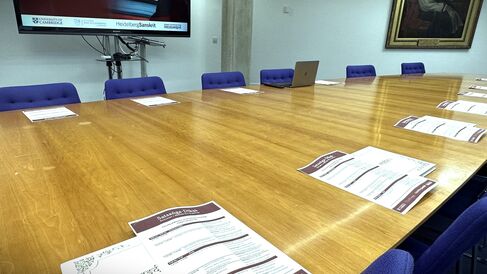Roundtables, symposia and webinars
Through a range of roundtables, webinars and symposia, we provide opportunities to explore topics of mutual interest.
Roundtables
Framed by input from selected experts—whether that be gained through research, practice, or lived experience—roundtables provide an effective window into the chosen topic. This is a perfect option to gather insights from different perspectives. Roundtables can capture attention for a neglected domain, illustrating the state of the field in way that is accessible across disciplines and sectors.
They may also serve as a prequel to some more sustained activity.
Depending on budget and logistics, we can support on site roundtables with up to 25 participants. We recommend 2–8 scheduled speakers to allow time for informal discussion. Where a more open session is desired, we also support techniques such as the fishbowl approach, allowing participants to step into a speaker spot alongside invited guests. We also facilitate similar sessions online.
Webinars
Convened on a standalone basis or in miniseries, co-hosted webinars offer a modest opportunity for sustained discussion across the boundaries of research and practice. While Community of Research and Practice sessions are for a closed audience, webinars provide a critical thinking space that is open to all comers, extending the opportunity to connect with people facing similar questions and challenges.
The informal mode ensures accessibility, combining short introductory talks and inviting discussion.
CIKH supports researchers and external partners to identify areas of mutual interest, enabling co-design of joint webinars and providing online hosting, including registration and follow-up engagement opportunities.
Previous examples include the Language learning series coordinated with Leo Baeck College and the Introduction to Hinduism series with Project Noon.
Symposia
Symposia combine the short-talk, taster approach of research–practice webinars with an on-campus experience, enabling face-to-face networking and sociability. The schedule may include parallel or breakout sessions.
Half or full-day programmes are possible, and the CIKH team can support design, drawing in additional contributors from our networks where relevant. We can also support away days and targeted engagements (fees apply).
Members of the Cambridge Interfaith Research Forum may apply for small grant funding to set up a symposium with one or more partners. This is normally combined with a small registration fee to cover direct costs for observers.
Examples include an annual Autumn session run jointly with the Faculty of Education and the Faith & Belief Forum.

Case studies
Explore examples of our work in this domain
